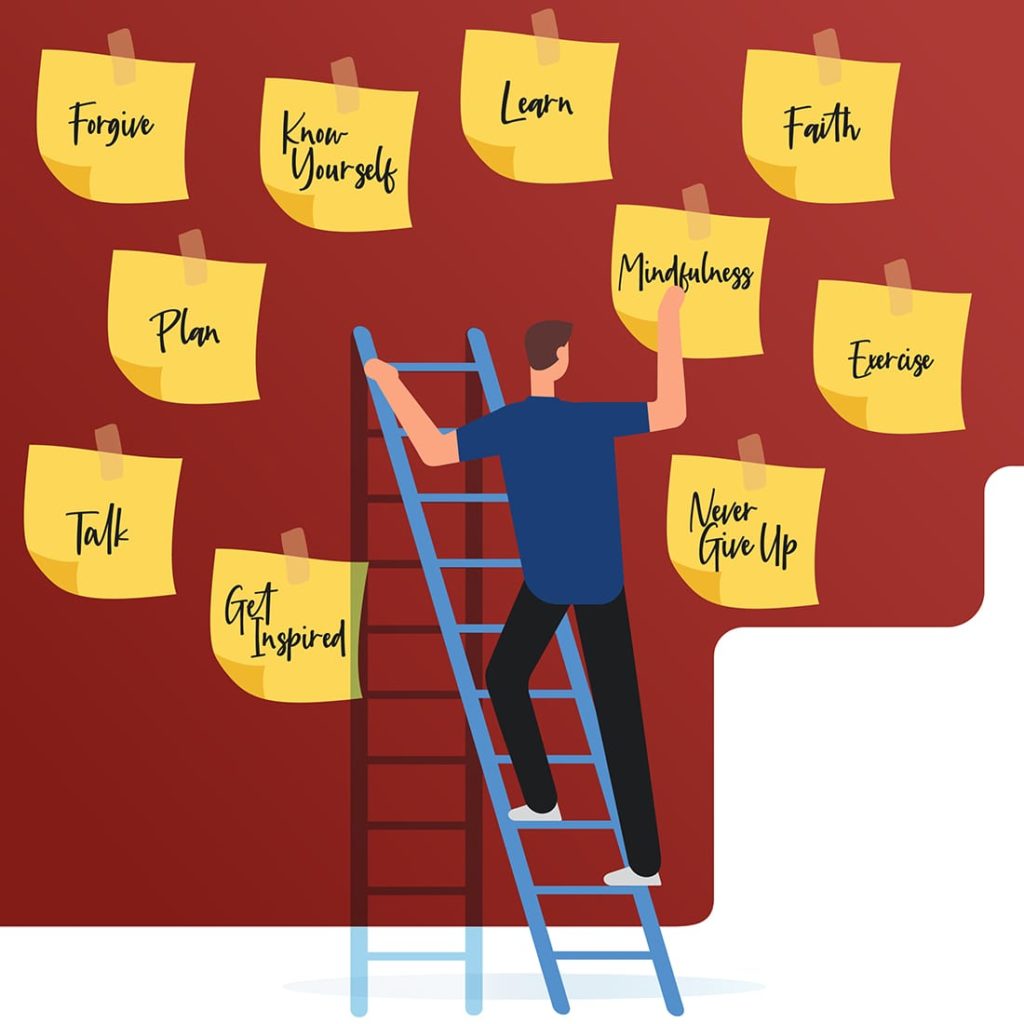In Canada, roughly 6 million people will struggle with addiction issues at some point in their lives. That’s 21% of the population. You aren’t alone.
Getting sober is an incredible achievement — staying sober is even harder. Managing addiction is complex and nuanced, and certainly not easy. It’s a whole-body, whole-mind process that doesn’t look the same for everyone.
While everyone’s path to recovery will look different, there are some tried-and-true tips for maintaining your sobriety and continuing on a positive path. Read on to discover 10 tips to help you stay sober.

10 Tips to Help You Stay Sober
1. Join a Recovery Group
Finding support and talking with people who share similar experiences is a big part of staying sober. A recovery group is a non-judgemental, encouraging atmosphere where you’ll feel supported on your journey.
There are formal, structured recovery programs with milestones and steps, led by mental health professionals. There are also more informal recovery groups, focused on peer support and mentorship.
It’s important that the type of recovery group you join be one that you feel comfortable attending regularly. We offer several recovery programs to suit your individual needs.
2. Discover a New Hobby
People with a dedicated hobby tend to have better mental health overall. If there’s something you’ve always wanted to learn or an activity you’ve been waiting to try, there’s no time like the present!
A hobby doesn’t have to be anything too time-consuming or complicated. Hobbies can be as simple as knitting or reading, learning a language or painting. You can also try something more active like rock-climbing or dancing.
You don’t have to spend money to pick up a new hobby either — there’s plenty of books at the library and many how-to videos online. Just remember that starting something adventurous or doing something that puts you in a new social situation can be stressful.
You may need some extra support when embarking on a new adventure.
3. Center Your Faith
It’s no secret that faith reduces the risks of alcohol and substance dependence. If you’ve never attended church before, it’s a great time to start. Churches are welcoming to new congregants and you’ll probably make some new, supportive friends.
Finding faith is a great way to center something much bigger than yourself. Church leaders are excellent sources of support and care and will provide much-needed encouragement in your sobriety journey. That’s why we take a faith-based approach in our recovery programs.
4. Choose Mindfulness
Practicing mindfulness might help you stay grounded in the present moment. It helps you to stop dwelling on the past or fretting about the future.
Meditation is a common form of mindfulness practice and it’s easy to start. You don’t need any special equipment — just yourself and a quiet place.
If you’re new to practicing mindfulness, start by focusing on your breathing. The goal is to clear your mind of any distractions and focus on the here and how. Research shows that practicing mindfulness can provide significant benefits to people struggling with addiction issues.
5. Get Moving
Studies show that exercise can help people stay sober. Exercising doesn’t have to be daunting. You don’t have to scale a mountain or run a marathon.
Exercise can be as simple as going for a walk, heading to the local pool for a swim, or going to an outdoor rink for a skate in the winter.
An added benefit that comes from exercising is the opportunity to meet new people with healthy lifestyles.
6. Know Yourself
When you’re trying to stay sober, it’s important to know yourself and know your addiction triggers. A trigger is any external factor that might encourage or entice you to use again.
If being out for dinner at loud restaurants with dancing makes you want to use alcohol, avoid those places. If a certain friend is someone you used to use drugs with, you might want to stay away from that friend, particularly in the early stages of recovery.
7. Get Inspired
It might seem difficult, some days more than others, but there are strong, inspirational people who have come before you. Familiarize yourself with their stories. You might see some of yourself and your circumstances reflected in their journeys.
Human beings are resilient. Seeing how far other people have come can provide you with the inspiration you need to keep moving forward.
8. Make a Plan
Holidays and special events can be particularly difficult times for staying sober. People gather together and it’s a celebratory and sometimes even stressful time. It’s important to remember that holidays are just as enjoyable — perhaps even more so — without alcohol and other substances.
Make a point of knowing what events and holidays are coming up and make a plan to celebrate them sober. If there are friends or family members who don’t help your recovery, make plans with other people during these times.
If you are attending family events or gatherings with friends, plan for a phone call with your sponsor, faith leader, or other supportive person both before and after the event. These check-ins increase accountability and give you much-needed reinforcements.
Holidays are also a great time to go to church and faith leaders can provide advice and compassion.
9. Never Give Up
The journey to sobriety isn’t always linear. Approximately 40 to 60 percent of people who are recovering from addiction issues will relapse at some point in their lives. It doesn’t mean you’ve failed.
It’s important not to let a relapse set you back too far. Understand that your choice to get sober took incredible strength. Harness that strength and start again.
10. Forgive Yourself
Give yourself credit for all that has gone right so far. If you’ve accepted that you need to get sober, that’s an achievement worth celebrating. Addiction is not a choice, but recovery is — and it’s one you’ve made.
If you’re angry with yourself, write it down, dance it out, or talk to a friend. Then, practice affirming statements. Say “I forgive myself” and “I deserve love” out loud.
Compassion is an important part of recovery — it includes compassion for yourself.
Help Is Nearby
Our faith-based recovery centre makes transformative changes in the lives of our community. Addiction recovery is a process unique to every individual and each journey to sobriety will look a little different.



